Konjac: The Versatile and Healthy Superfood from Asia
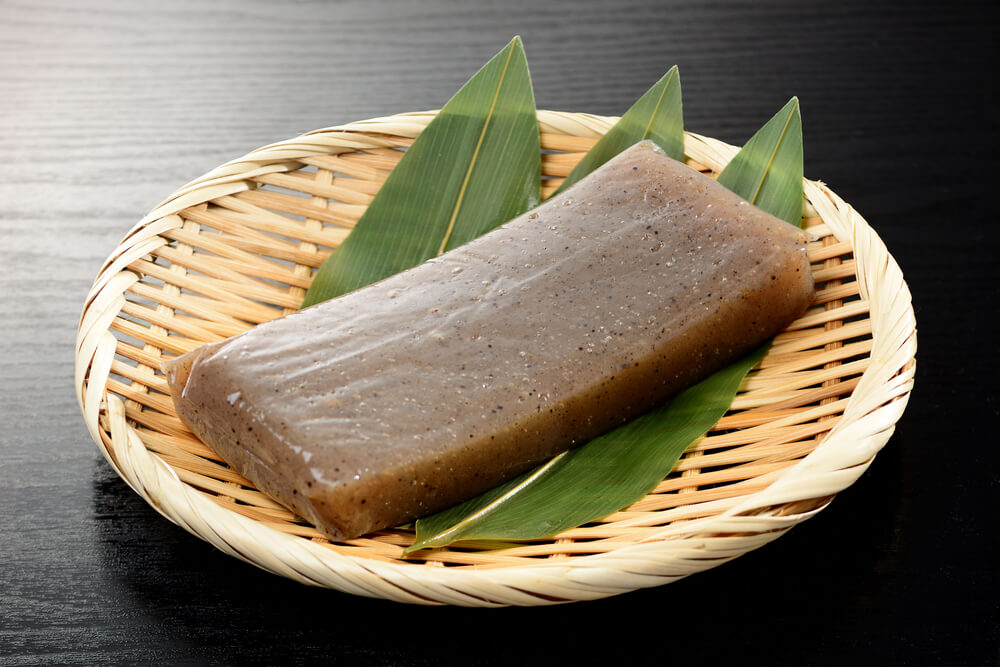
Those looking to incorporate new, lower-calorie foods into their diet have likely heard of konjac noodles (shirataki noodles). These noodles are made with the konjac yam, a common ingredient in Asian recipes for many years. However, konjac isn't just in noodle form; it's also available as konjac jelly, konjac powder, drinks, and more. Since konjac has such a mild flavor, it can be made into sweet/savory foods, fruity drinks, etc.
Here's all you need to know about konjac, from its potential health benefits to ways to enjoy this superfood.
Introduction to Konjac: More Than Just a Plant
Konjac, a root vegetable also known as the elephant yam, typically grows on the side of mountains at 2000-4000 feet above sea level. These conditions help provide the ideal temperature, water, and air for the vegetables to grow. While many enjoy konjac in foods, it is also used as medicine, especially in Asian countries. It has a large amount of dietary fiber, so it's considered medicinal food.
It's also used outside of Asia as a dietary supplement or as an additional ingredient in foods to help with digestion, break down carbs, and improve plasma cholesterol levels.
An overview of the konjac plant and its significance in Asian cuisine and health.
Konjac Noodles and Shirataki: A Low-Calorie Delight
As mentioned, konjac is often consumed in the form of konjac noodles. These noodles are high in fiber, low in calories, and mild in taste, so you can easily add your favorite seasonings/sauces to them. They are made from konjac flour, water, and lime water, which creates white/translucent shirataki noodles. The best part about these noodles is they're quite versatile, especially once you've mastered how to prepare konjac noodles.
You can use them for Asian-inspired recipes like stir-fries, pho, and ramen. Or, turn them into a delicious cold noodle and vegetable salad. These noodles are also great for American dishes, like spaghetti with meatball sauce. You can use these noodles to replace other options like rice noodles in recipes to help cut calories.
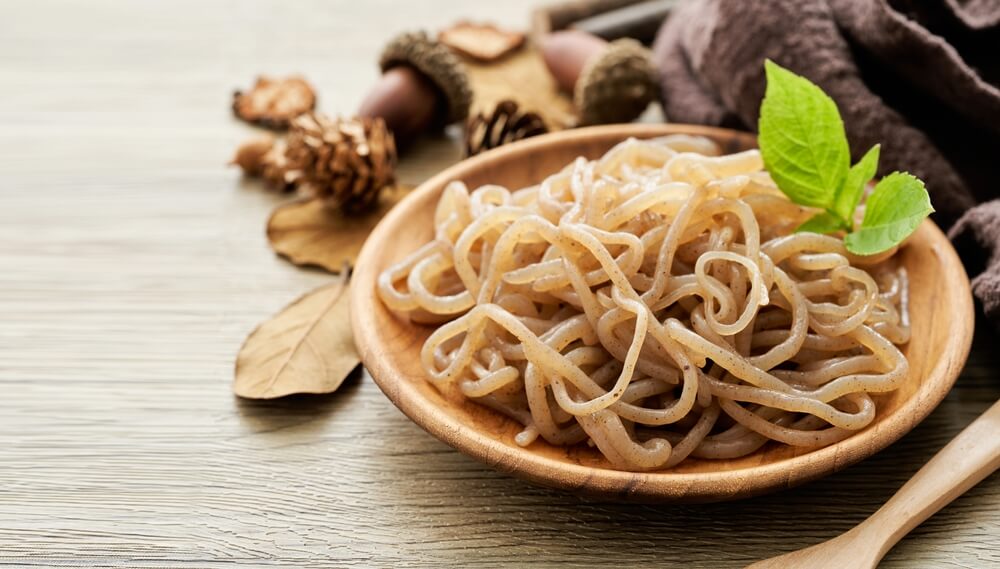
The Rise of Konjac Jelly and Fruit Jelly Variants
Though konjac is not a new ingredient in Asian cuisine (it's been around since the sixth century!), it remained primarily a delicacy for the royals (and medicinal food for the Buddhist monks) until the 18th century. In the 1700s, the process of creating konjac powder came about. This process allowed the powder to be stored on the shelf and made it easier to ship throughout the country. Once the powder was available, it allowed people the ability to experiment with konjac. Since then, it has developed into various foods, including konjac fruit jelly.
Konjac jelly provides various nutrients and easily pairs with different fruit flavors, so it's an ideal ingredient for fruit jelly. With options ranging from sweetened to sugar-free, it's quite easy to see why konjac fruit jelly is an excellent healthy snack.
It's even available in drink form, so you can sip on the fruity jelly as a convenient snack. As a drink, you'll see options like Jelly.B Low Calorie Drinkable Konjac Jelly: Peach and Jelly.B Low Calorie Drinkable Konjac Jelly: Lychee. However, you can also expect to see many other fruit flavors, like mango and muscat grape.
Sashimi Konnyaku: A Unique Culinary Experience
Konnyaku (another way to refer to konjac jelly) is also popular for those who want to enjoy sashimi (sans fish). Sashimi konnyaku is made by thinly slicing konjac jelly and then serving it with either soy sauce and wasabi or sweet miso and spicy mustard sauce. Often, people will eat this version of sashimi because they are vegetarian, vegan, or simply want the health benefits of the konjac plant.
With the rise in availability and popularity of konjac in its various forms, you'll see it used for traditional and modern recipes. For example, sashimi konjac, which is a newer food, uses this ingredient. Though sashimi has been around since 1190, it was typically topped with raw fish and seafood. Using chewy konjac jelly to replace the raw fish shows how it's growing in diversity.
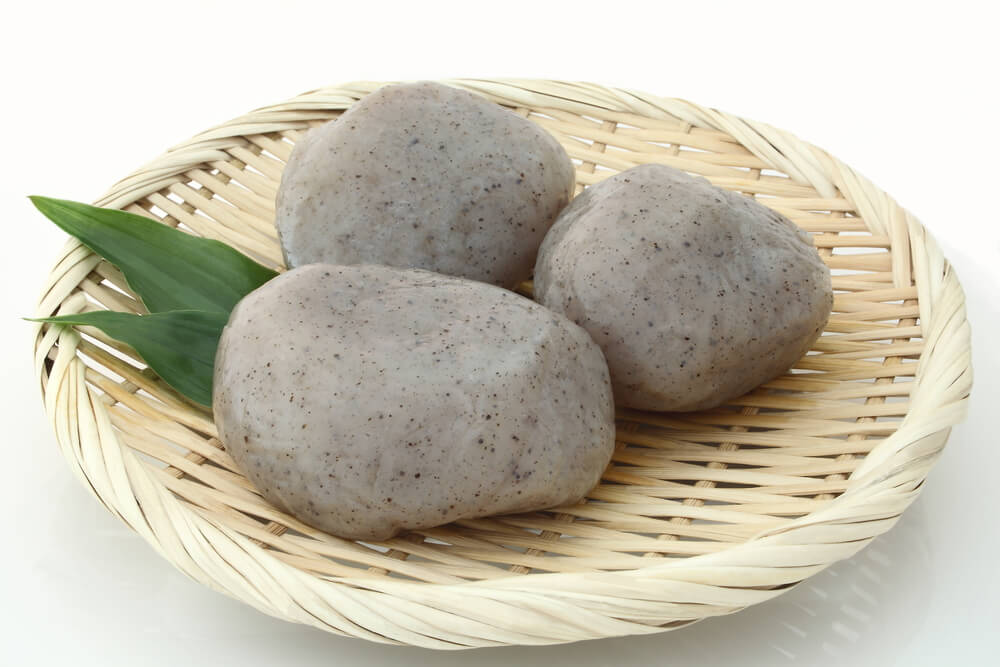
Konjac Flour and Powder: Versatile Kitchen Staples
Because it's so versatile, konjac flour/powder/jelly can be used for desserts, puddings, and other sweet recipes that typically call for gelatin. You can even use it to thicken recipes, like soups and sauces. This ingredient is vegan, gluten-free, and low in sugar, so it's a great option for those with health in mind or food restrictions. You can also use this powder to make homemade noodles and rice-like grains.
Seaweed Powder and Pulverized Konnyaku Powder: Nutritious Additions
Like konnyaku powder, seaweed powder (an ingredient in konjac jelly) is packed with nutrients and offers many health benefits. It's got B and C vitamins that help keep your skin looking healthy. It has other potential health benefits, including reducing acne and toxins in the body. You can easily add seaweed powder to your diet by using it as a seasoning agent. Mix it with a spice blend to create a salty, umami-rich flavor in your dishes. You can also sprinkle it over items for a burst of flavor, like roast vegetables or popcorn.
As far as pulverized konnyaku powder, it has the same nutrients and potential health benefits as other versions of konjac. You can use this powder to help make gravies, soups, and sauces thicker, as it acts like a gum (like xanthan gum). You can also turn it into jelly candy, sweet gelatin-like recipes, and pudding. It's quite a versatile ingredient.
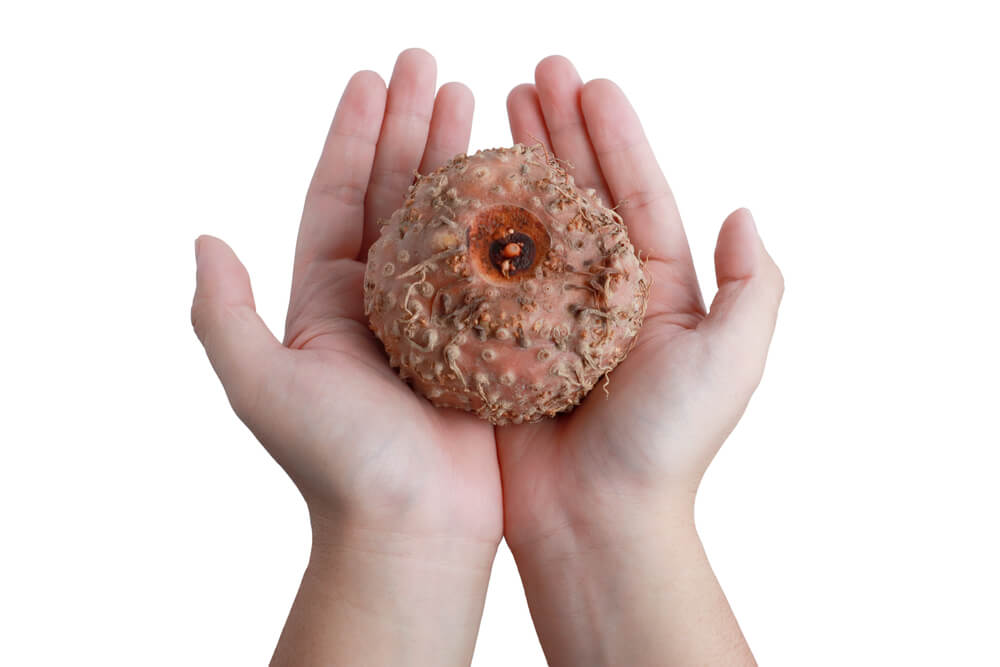
Konnyaku Noodles: The Miracle Noodles for a Healthy Diet
With the low amount of calories, low sugar, and other health benefits, it's easy to see why konnyaku noodles are also called miracle noodles. Since they resemble pasta, it's easy to incorporate them into any diet (gluten-free, vegan, low-carb, vegetarian, etc.). They're also quite easy to prepare; you only need to rinse konjac noodles in cool water for a minute, and then they're ready to use. You can add these noodles to recipes that typically call for other types of noodles, like spaghetti or ramen noodles.
This is a key ingredient for those focused on a healthy lifestyle, avoiding excess carbs ,or wanting to enjoy their favorite dishes with fewer calories. Since these noodles are chewy, they easily mimic other noodle options, so you don't feel like you're missing out. Additionally, these noodles have no flavor, so you can season them as you please.
Of course, konjac noodles are only one way to enjoy this superfood. You can also drink it in the form of fruit konjac jelly (as mentioned above). Options like Tarami Oishii Konjac Jelly: Grape are a great way to get fiber into one's diet in a tasty manner (so even kids can enjoy konjac).
The Medicinal Benefits of the Konjac Plant
So, what makes konjac such a superfood? Its large amount of fiber (about 2.5g of fiber per 2g of powder) helps keep digestion regular. This fiber content also provides other benefits, like potential weight loss, as it's one nutrient that helps keep you full for longer. The particular type of soluble fiber found in the konjac plant is glucomannan, which has also been connected to a potential reduction in LDL (bad cholesterol) and the risk of heart disease. Additionally, studies have been conducted that show glucomannan may be an alternate treatment for diabetes and high blood pressure.
One of the other potential benefits of konjac is healthier skin. This medicinal food is thought to help eliminate acne and allergic reactions. Additionally, it can help with healing wounds. In Chinese medicine, the uses for konjac were slightly different. It was previously used in gel form to help keep tumors small, detox the body, and get rid of blood stasis (aka stagnant blood). When consumed as a medicinal food, this plant was used to treat asthma, burns, hernias, and even to help with skin disorders.
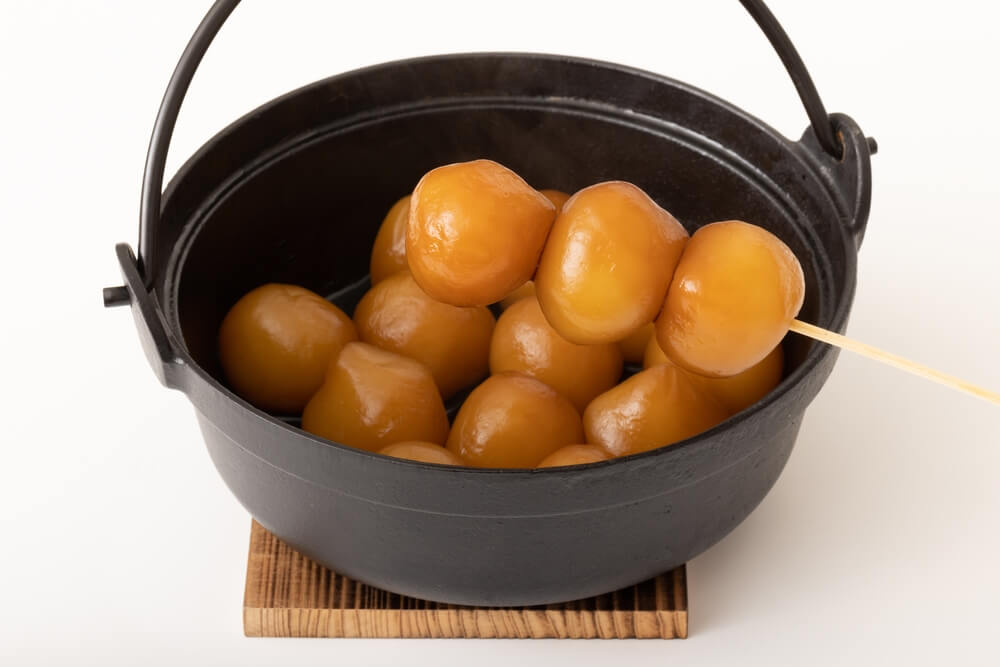
Innovative Recipes with Konjac: From Appetizers to Desserts
Here are some fun recipes to try with konjac noodles, jelly, and powder, ranging from sweet to savory.
-
Buttered konjac noodles with seafood. You'll want to pan-fry your favorite seafood (fish, shellfish, etc.) with butter and minced garlic for this recipe. Once the seafood is mostly cooked, add in the noodles and salt/pepper. Pan-fry for an extra 1-2 minutes to create a delicious dish. When serving, top the recipe with fresh chopped parsley.
-
Stir-fry shirataki noodles. One of the easiest ways to enjoy konjac noodles is by tossing together a stir-fry. Grab veggies and protein of choice (like bok choy and chicken), then pan-fry with sesame oil, garlic, and ginger. Once cooked, add the noodles, soy sauce, brown sugar, and rice vinegar. Allow to simmer for a few minutes until the sauce has thickened slightly. Serve with sliced green onions.
-
Konjac jelly candies. You'll only need a few ingredients to make hard candies from konjac. Grab a packet of konjac jelly powder, jam or preserves of your choosing, and citrus (for zest). Combine the ingredients in a saucepan with water and bring to a boil. Then, add malic acid and pour the mixture into candy forms. Allow to rest, and you'll have yummy fruit candies in a few hours.
-
Low-calorie tortillas. Konjac powder is a great way to boost the fiber in recipes like low-calorie tortillas. Simply combine konjac, almond, and coconut flour with eggs, oil, salt, and water. Knead the dough, then separate it into even dough balls. Press the dough (or roll it out) into tortillas. Then, pan-fry until cooked (should be lightly toasted on each side).
Conclusion: Embracing Konjac in Your Daily Diet
If you haven't tried konjac before, now's the time! With so many ways to use konjac, from sweet fruit jellies to drinks, konjac noodles, and more, it's easy to find a way to incorporate this ingredient into your diet. Plus, who doesn't want potential benefits like healthy skin, better digestion, higher levels of immunity, etc.? While it's not necessary to eat konjac every day, it is easy to get more fiber into your diet in dishes (like ramen) that aren't usually known for having a lot of fiber. That way, you won't have to add fiber dietary supplements to your routine.
Bokksu Market is your spot for all things related to Asian cuisine, including the konjac goodies mentioned above! You'll also find snacks, sweets, drinks, frozen ready-to-eat meals, and more. Shop Bokksu for all your Asian-food (and non-food) related needs, from cookware to clothing; we have it all.
Author Bio









